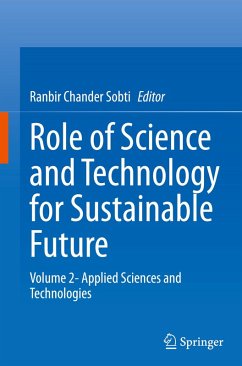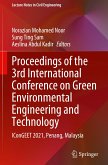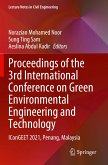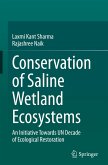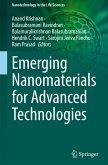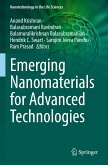Role of Science and Technology for Sustainable Future
Volume 2- Applied Sciences and Technologies
Herausgegeben:Sobti, Ranbir Chander
Role of Science and Technology for Sustainable Future
Volume 2- Applied Sciences and Technologies
Herausgegeben:Sobti, Ranbir Chander
- Gebundenes Buch
- Merkliste
- Auf die Merkliste
- Bewerten Bewerten
- Teilen
- Produkt teilen
- Produkterinnerung
- Produkterinnerung
This book discusses the role of science and technology in forging a sustainable and harmonious world. It delves into new horizons in healthcare, food security, climate change, energy, sustainable transportation, role of computational and data sciences in sustainability, and mental health and aims to cultivate innovative solutions that benefit both the planet and its inhabitants.
The second volume is inspired by a unified objective: preserving our planet, fostering universal well-being, and envisioning a world where collective efforts drive positive change through an exploration of…mehr
Andere Kunden interessierten sich auch für
![Proceedings of the 3rd International Conference on Green Environmental Engineering and Technology Proceedings of the 3rd International Conference on Green Environmental Engineering and Technology]() Proceedings of the 3rd International Conference on Green Environmental Engineering and Technology177,99 €
Proceedings of the 3rd International Conference on Green Environmental Engineering and Technology177,99 €![Proceedings of the 3rd International Conference on Green Environmental Engineering and Technology Proceedings of the 3rd International Conference on Green Environmental Engineering and Technology]() Proceedings of the 3rd International Conference on Green Environmental Engineering and Technology127,99 €
Proceedings of the 3rd International Conference on Green Environmental Engineering and Technology127,99 €![Conservation of Saline Wetland Ecosystems Conservation of Saline Wetland Ecosystems]() Laxmi Kant SharmaConservation of Saline Wetland Ecosystems123,99 €
Laxmi Kant SharmaConservation of Saline Wetland Ecosystems123,99 €![Nanosponges for Environmental Remediation Nanosponges for Environmental Remediation]() Nanosponges for Environmental Remediation131,99 €
Nanosponges for Environmental Remediation131,99 €![Emerging Nanomaterials for Advanced Technologies Emerging Nanomaterials for Advanced Technologies]() Emerging Nanomaterials for Advanced Technologies123,99 €
Emerging Nanomaterials for Advanced Technologies123,99 €![Emerging Nanomaterials for Advanced Technologies Emerging Nanomaterials for Advanced Technologies]() Emerging Nanomaterials for Advanced Technologies123,99 €
Emerging Nanomaterials for Advanced Technologies123,99 €![Eel Science Eel Science]() Eel Science220,99 €
Eel Science220,99 €-
-
-
This book discusses the role of science and technology in forging a sustainable and harmonious world. It delves into new horizons in healthcare, food security, climate change, energy, sustainable transportation, role of computational and data sciences in sustainability, and mental health and aims to cultivate innovative solutions that benefit both the planet and its inhabitants.
The second volume is inspired by a unified objective: preserving our planet, fostering universal well-being, and envisioning a world where collective efforts drive positive change through an exploration of conventional and emerging technologies. The book chapters enrich the global discourse on sustainability, steering us toward a resilient and healthier future.
With every chapter authored by dedicated experts, this book stands as a testament to the commitment to a better world and serves as a great resource for researchers, environmentalists, and students.
The second volume is inspired by a unified objective: preserving our planet, fostering universal well-being, and envisioning a world where collective efforts drive positive change through an exploration of conventional and emerging technologies. The book chapters enrich the global discourse on sustainability, steering us toward a resilient and healthier future.
With every chapter authored by dedicated experts, this book stands as a testament to the commitment to a better world and serves as a great resource for researchers, environmentalists, and students.
Produktdetails
- Produktdetails
- Verlag: Springer / Springer Nature Singapore / Springer, Berlin
- Artikelnr. des Verlages: 978-981-97-5176-1
- Seitenzahl: 712
- Erscheinungstermin: 8. Januar 2025
- Englisch
- Abmessung: 241mm x 160mm x 44mm
- Gewicht: 1164g
- ISBN-13: 9789819751761
- ISBN-10: 9819751764
- Artikelnr.: 70931840
- Herstellerkennzeichnung Die Herstellerinformationen sind derzeit nicht verfügbar.
- Verlag: Springer / Springer Nature Singapore / Springer, Berlin
- Artikelnr. des Verlages: 978-981-97-5176-1
- Seitenzahl: 712
- Erscheinungstermin: 8. Januar 2025
- Englisch
- Abmessung: 241mm x 160mm x 44mm
- Gewicht: 1164g
- ISBN-13: 9789819751761
- ISBN-10: 9819751764
- Artikelnr.: 70931840
- Herstellerkennzeichnung Die Herstellerinformationen sind derzeit nicht verfügbar.
Professor Ranbir Chander Sobti is an emeritus professor at the Indian National Science Academy (INSA) and a senior scientist at Punjab University, Chandigarh, India. He is a former vice-chancellor of Panjab University, Chandigarh, and Babasaheb Bhimrao Ambedkar University (Central University), Lucknow, India. He started his career as a cytogeneticist and then moved on to molecular biology, including genomics, to understand the susceptibility and disease process of cancer, COPD, AIDS metabolic syndrome, and kidney diseases. He has also used stem cells and nanoparticles to understand the process of tissue organ development through a designed de-cellularization protocol. Professor Sobti has published numerous research articles in journals of international repute and has also published a lot of books. He is a fellow of the Third World Academy of Sciences, the National Academy of Sciences India, the Indian National Science Academy, the National Academy of Medical Sciences, the National Academy of Agricultural Sciences, the Canadian Academy of Cardiovascular Diseases, and others. He was the general president of the Indian Science Congress for the 102nd session held at the University of Jammu in 2013. Professor Sobti is the recipient of many prestigious awards like the INSA Young Scientist Medal, UGC Career Award, Punjab Rattan Award, JC Bose Oration and Sriram Oration Awards and Lifetime Achievement Awards of the Punjab Academy of Sciences, Zoological Society of India, and the Environment Academy of India. The Government of India bestowed upon him the honor of "PADMASHRI" in 2009 by rightfully acknowledging his outstanding contribution to higher education in India. In 2016, he was also honored with the 'Bharat Gaurav', Lifetime Achievement Award at the House of Commons, British Parliament, London, U.K.
Section-I: Introductory chapters.- Chapter 1. Science, Technology And Novelty For Sustainable Development Goals: Perspectives And Challenges From Environment, Ecology, And Human Society In A Changing World.- Chapter 2. Microbial Technology: A Green Path To Achieving Sustainable Development Goals.- Chapter 3. Perspectives On The Role Of Science And Technology For A Cleaner And Greener Tomorrow.- Section II: Role of Biological Innovations for Sustainable Development.- Chapter 4. Synthetic Biology: Engineering Life For Sustainable Applications.- Chapter 5. Biosurfactants: A Viable Approach Towards Environmental Sustainability.- Chapter 6. Plant-Based Super Foods For A Sustainable Future.- Chapter 7. Role Of Nanoscience And Nanotechnology In Sustainable Development.- Chapter 8. Biomedical Devices For Remote Diagnosis And Monitoring Based On Iot.- Chapter 9. Medical Physics Sustenance In Modern India.-
Chapter 10. Newer Devices And Remote Diagnostics And Monitoring Based On Iot.- Chapter 11. Bibliometric Analysis Of Biomedical Iot Devices For Remote Diagnosis And Monitoring.- Section III: Role of Biotechnological and Microbiological Advancements for Sustainable Development.- Chapter 12. Biotechnology As A Catalyst For Sustainable Development: Leveraging Innovation For Global Goals.- Chapter 13. Sustainable Development Of Agriculture Through Biotechnological Interventions- An Ideal Approach.- Chapter 14. Microalgae-Based Remediation Of Contaminated Water- A Way Forward To Achieve Sdgs Goal-6.- Chapter 15. Microbial Strategies to Remove Organic Pollutants and Heavy Metals From Water For Sustainable Human Civilization.- Chapter 16. Contributory Role of Biosurfactant in Creating a Sustainable Environment.- Chapter 17. Green Carbon Dots: A Ne Avenue Toards Sustainable Development.- Section IV: Role of Wastewater Treatment Technologies for Sustainable Development.- Chapter 18. Valorization Of Agro-Industrial Waste Into Value-Added Nutraceuticals For Sustainable Development.- Chapter 19. Navigating Sustainable And Healthy Future: Green Nanotechnology, Regulatory Priorities, And Challenges.- Chapter 20. From Challenges To Opportunities: Exploring Minimum Liquid Discharge And Zero Liquid Discharge Strategies For Wastewater Management And Resource Recovery.- Section V: Role of Applied Sciences for Sustainable Development.- Chapter 21. Microbial Biotechnology: A Catalyst For Sustainable Development And Circular Economies.- Chapter 22. Pharma Sciences As A Tool For Sustainable Development.- Chapter 23. Sustainable Practices And Circular Economy In Pharmaceutical Sciences In India And Abroad.- Chapter 24. Agro-Biotechnology: A Rescue Against World Hunger.- Chapter 25. Paving The Way For A Better Tomorrow.- Chapter 26. Present And Future Aspects Of Nuclear Medicine Technology For Sustainable Development In India.- Chapter 27. Geen Hrm : Catalyst For Sustainable Development And Organizational Success.- Chapter 28. Journey Of Indian Space Organisation (Isro).- Section VI: Technological Interventions for Sustainable Development.- Chapter 29. The Role Of Computer Science In Advancing Sustainable Development Goals: A Comprehensive Analysis.- Chapter 30. From Code To Sustainability: The Impact Of Computer Science For Sustainable Development.- Chapter 31. Role Of Molecular Modelling In Sustainable Development.- Chapter 32. Recent Advances in Self-Healing Electronic Materials for Energy-Harvesting Devices.- Chapter 33. Flow of Complex Fluids Through Packed Bed.- Chapter 34. Role of Geospatial Technology for Sustainable Development in India.
Chapter 10. Newer Devices And Remote Diagnostics And Monitoring Based On Iot.- Chapter 11. Bibliometric Analysis Of Biomedical Iot Devices For Remote Diagnosis And Monitoring.- Section III: Role of Biotechnological and Microbiological Advancements for Sustainable Development.- Chapter 12. Biotechnology As A Catalyst For Sustainable Development: Leveraging Innovation For Global Goals.- Chapter 13. Sustainable Development Of Agriculture Through Biotechnological Interventions- An Ideal Approach.- Chapter 14. Microalgae-Based Remediation Of Contaminated Water- A Way Forward To Achieve Sdgs Goal-6.- Chapter 15. Microbial Strategies to Remove Organic Pollutants and Heavy Metals From Water For Sustainable Human Civilization.- Chapter 16. Contributory Role of Biosurfactant in Creating a Sustainable Environment.- Chapter 17. Green Carbon Dots: A Ne Avenue Toards Sustainable Development.- Section IV: Role of Wastewater Treatment Technologies for Sustainable Development.- Chapter 18. Valorization Of Agro-Industrial Waste Into Value-Added Nutraceuticals For Sustainable Development.- Chapter 19. Navigating Sustainable And Healthy Future: Green Nanotechnology, Regulatory Priorities, And Challenges.- Chapter 20. From Challenges To Opportunities: Exploring Minimum Liquid Discharge And Zero Liquid Discharge Strategies For Wastewater Management And Resource Recovery.- Section V: Role of Applied Sciences for Sustainable Development.- Chapter 21. Microbial Biotechnology: A Catalyst For Sustainable Development And Circular Economies.- Chapter 22. Pharma Sciences As A Tool For Sustainable Development.- Chapter 23. Sustainable Practices And Circular Economy In Pharmaceutical Sciences In India And Abroad.- Chapter 24. Agro-Biotechnology: A Rescue Against World Hunger.- Chapter 25. Paving The Way For A Better Tomorrow.- Chapter 26. Present And Future Aspects Of Nuclear Medicine Technology For Sustainable Development In India.- Chapter 27. Geen Hrm : Catalyst For Sustainable Development And Organizational Success.- Chapter 28. Journey Of Indian Space Organisation (Isro).- Section VI: Technological Interventions for Sustainable Development.- Chapter 29. The Role Of Computer Science In Advancing Sustainable Development Goals: A Comprehensive Analysis.- Chapter 30. From Code To Sustainability: The Impact Of Computer Science For Sustainable Development.- Chapter 31. Role Of Molecular Modelling In Sustainable Development.- Chapter 32. Recent Advances in Self-Healing Electronic Materials for Energy-Harvesting Devices.- Chapter 33. Flow of Complex Fluids Through Packed Bed.- Chapter 34. Role of Geospatial Technology for Sustainable Development in India.
Section-I: Introductory chapters.- Chapter 1. Science, Technology And Novelty For Sustainable Development Goals: Perspectives And Challenges From Environment, Ecology, And Human Society In A Changing World.- Chapter 2. Microbial Technology: A Green Path To Achieving Sustainable Development Goals.- Chapter 3. Perspectives On The Role Of Science And Technology For A Cleaner And Greener Tomorrow.- Section II: Role of Biological Innovations for Sustainable Development.- Chapter 4. Synthetic Biology: Engineering Life For Sustainable Applications.- Chapter 5. Biosurfactants: A Viable Approach Towards Environmental Sustainability.- Chapter 6. Plant-Based Super Foods For A Sustainable Future.- Chapter 7. Role Of Nanoscience And Nanotechnology In Sustainable Development.- Chapter 8. Biomedical Devices For Remote Diagnosis And Monitoring Based On Iot.- Chapter 9. Medical Physics Sustenance In Modern India.-
Chapter 10. Newer Devices And Remote Diagnostics And Monitoring Based On Iot.- Chapter 11. Bibliometric Analysis Of Biomedical Iot Devices For Remote Diagnosis And Monitoring.- Section III: Role of Biotechnological and Microbiological Advancements for Sustainable Development.- Chapter 12. Biotechnology As A Catalyst For Sustainable Development: Leveraging Innovation For Global Goals.- Chapter 13. Sustainable Development Of Agriculture Through Biotechnological Interventions- An Ideal Approach.- Chapter 14. Microalgae-Based Remediation Of Contaminated Water- A Way Forward To Achieve Sdgs Goal-6.- Chapter 15. Microbial Strategies to Remove Organic Pollutants and Heavy Metals From Water For Sustainable Human Civilization.- Chapter 16. Contributory Role of Biosurfactant in Creating a Sustainable Environment.- Chapter 17. Green Carbon Dots: A Ne Avenue Toards Sustainable Development.- Section IV: Role of Wastewater Treatment Technologies for Sustainable Development.- Chapter 18. Valorization Of Agro-Industrial Waste Into Value-Added Nutraceuticals For Sustainable Development.- Chapter 19. Navigating Sustainable And Healthy Future: Green Nanotechnology, Regulatory Priorities, And Challenges.- Chapter 20. From Challenges To Opportunities: Exploring Minimum Liquid Discharge And Zero Liquid Discharge Strategies For Wastewater Management And Resource Recovery.- Section V: Role of Applied Sciences for Sustainable Development.- Chapter 21. Microbial Biotechnology: A Catalyst For Sustainable Development And Circular Economies.- Chapter 22. Pharma Sciences As A Tool For Sustainable Development.- Chapter 23. Sustainable Practices And Circular Economy In Pharmaceutical Sciences In India And Abroad.- Chapter 24. Agro-Biotechnology: A Rescue Against World Hunger.- Chapter 25. Paving The Way For A Better Tomorrow.- Chapter 26. Present And Future Aspects Of Nuclear Medicine Technology For Sustainable Development In India.- Chapter 27. Geen Hrm : Catalyst For Sustainable Development And Organizational Success.- Chapter 28. Journey Of Indian Space Organisation (Isro).- Section VI: Technological Interventions for Sustainable Development.- Chapter 29. The Role Of Computer Science In Advancing Sustainable Development Goals: A Comprehensive Analysis.- Chapter 30. From Code To Sustainability: The Impact Of Computer Science For Sustainable Development.- Chapter 31. Role Of Molecular Modelling In Sustainable Development.- Chapter 32. Recent Advances in Self-Healing Electronic Materials for Energy-Harvesting Devices.- Chapter 33. Flow of Complex Fluids Through Packed Bed.- Chapter 34. Role of Geospatial Technology for Sustainable Development in India.
Chapter 10. Newer Devices And Remote Diagnostics And Monitoring Based On Iot.- Chapter 11. Bibliometric Analysis Of Biomedical Iot Devices For Remote Diagnosis And Monitoring.- Section III: Role of Biotechnological and Microbiological Advancements for Sustainable Development.- Chapter 12. Biotechnology As A Catalyst For Sustainable Development: Leveraging Innovation For Global Goals.- Chapter 13. Sustainable Development Of Agriculture Through Biotechnological Interventions- An Ideal Approach.- Chapter 14. Microalgae-Based Remediation Of Contaminated Water- A Way Forward To Achieve Sdgs Goal-6.- Chapter 15. Microbial Strategies to Remove Organic Pollutants and Heavy Metals From Water For Sustainable Human Civilization.- Chapter 16. Contributory Role of Biosurfactant in Creating a Sustainable Environment.- Chapter 17. Green Carbon Dots: A Ne Avenue Toards Sustainable Development.- Section IV: Role of Wastewater Treatment Technologies for Sustainable Development.- Chapter 18. Valorization Of Agro-Industrial Waste Into Value-Added Nutraceuticals For Sustainable Development.- Chapter 19. Navigating Sustainable And Healthy Future: Green Nanotechnology, Regulatory Priorities, And Challenges.- Chapter 20. From Challenges To Opportunities: Exploring Minimum Liquid Discharge And Zero Liquid Discharge Strategies For Wastewater Management And Resource Recovery.- Section V: Role of Applied Sciences for Sustainable Development.- Chapter 21. Microbial Biotechnology: A Catalyst For Sustainable Development And Circular Economies.- Chapter 22. Pharma Sciences As A Tool For Sustainable Development.- Chapter 23. Sustainable Practices And Circular Economy In Pharmaceutical Sciences In India And Abroad.- Chapter 24. Agro-Biotechnology: A Rescue Against World Hunger.- Chapter 25. Paving The Way For A Better Tomorrow.- Chapter 26. Present And Future Aspects Of Nuclear Medicine Technology For Sustainable Development In India.- Chapter 27. Geen Hrm : Catalyst For Sustainable Development And Organizational Success.- Chapter 28. Journey Of Indian Space Organisation (Isro).- Section VI: Technological Interventions for Sustainable Development.- Chapter 29. The Role Of Computer Science In Advancing Sustainable Development Goals: A Comprehensive Analysis.- Chapter 30. From Code To Sustainability: The Impact Of Computer Science For Sustainable Development.- Chapter 31. Role Of Molecular Modelling In Sustainable Development.- Chapter 32. Recent Advances in Self-Healing Electronic Materials for Energy-Harvesting Devices.- Chapter 33. Flow of Complex Fluids Through Packed Bed.- Chapter 34. Role of Geospatial Technology for Sustainable Development in India.

